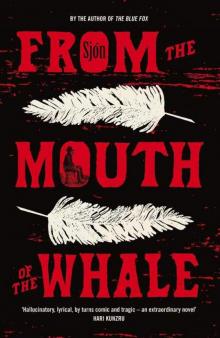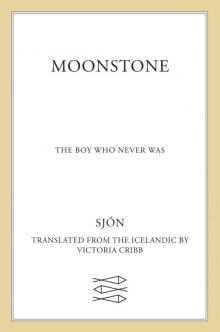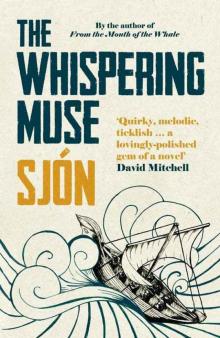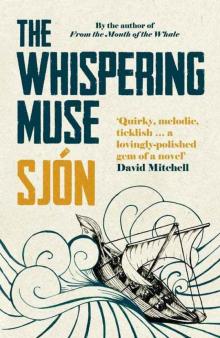From the Mouth of the Whale Read online
From the Mouth
of the Whale
Sjón
Translated from the Icelandic
by Victoria Cribb
TELEGRAM
EBOOK ISBN: 978-1-84659-101-3
First published 2008 as Rökkurbýsnir by Bjartur, Reykjavík
First English edition published 2011 by Telegram
This ebook edition published 2011
© Sjón, 2008 and 2011
Translation © Victoria Cribb, 2011
All rights reserved. No part of this book may be reproduced or
transmitted in any form or by any means, electronic or mechanical,
including photocopying, recording or by any information storage
and retrieval system, without permission in writing from the
publisher.
This book is sold subject to the condition that it shall not, by
way of trade or otherwise, be lent, re-sold, hired out, or otherwise
circulated without the publisher’s prior consent in any form
of binding or cover other than that in which it is published and
without a similar condition including this condition being imposed
on the subsequent purchaser.
A full CIP record for this book is available from the
British Library.
A full CIP record for this book is available from the
Library of Congress.
TELEGRAM
26 Westbourne Grove, London W2 5RH
www.telegrambooks.com
This book has been published with financial support from Bókmenntasjóður / The Icelandic Literature Fund
‘Soon it seemed to him that the stars had become men,
the men stars, the stones beasts,
the clouds plants …’
Novalis, The Novices of Sais
Prelude
I was on my way home from the hunt. In my right hand I held my net, in my left a lantern, and in the pack slung over my back was my prey, a wild boar with tusks of steel; a colossal beast that had run amok in the lands of the north, wreaking havoc until the alarm was raised and I was charged with hunting it down. It was not the first of the North Wind’s monstrous brood that I had laid low – the wolf that wept tears of milk, the one-footed water hare, the bull elk with the golden pizzle and the queen of the shag-haired trout had all made acquaintance with my net – but this huge-tusked boar was without doubt the most savage brute the north had ever snorted from its icy nostril.
Instead of leaving the carcass on the bloody field as the laws decreed, I brought it with me, intending to cast it at my brothers’ feet. Then the Father would see which of his sons laboured hardest to keep our world in check: those who never stirred from the all-encompassing paternal abode where they occupied themselves with administrative business (such was the euphemism for courtly life), or I who flew far and wide, dispatching monsters.
The void crunched under my heels as I strode homeward. Ahead the evening meal awaited me in the glorious, scintillating palace with all its towers and spires streaming into space like the babbling of a newborn sun. I meant to rise to my feet between the main and dessert courses, walk over to my brothers and whip the steel-tusker from my pack. But I had not gone far before I perceived that all was not well in Seventh Heaven. There was no watch at the gate, no call of ‘Ho, who goes there?’ from the ramparts, no sound of merrymaking from the banqueting hall, no lovers enjoying a secret tryst in the gateway. Instead, my trained hunter’s ears caught the rustle of nervous wings and the anguished moans that stick fast in the throat. I threw down my lantern, net and pack. Next moment I was in the courtyard; an instant later I was running up the steps to the throne room where I flung open the doors.
Conditions in the chamber were sickening; many of the angels were laughing with fear, others were weeping with hollow laughter, still others laughed and wept at once. The Ophanim had cast off their robes and knelt with brows pressed to the cold steps of the throne, letting fly with knotted scourges on their blazing shoulders. The youngest brothers were running around the chamber as aimlessly as babes, ceaselessly screeching their father’s name. The most sensitive were slumped against pillars and benches, vomiting spasmodically, the ectoplasm gushing from their mouths to flow unchecked over the azure floors of Heaven. Underlying the hideous spectacle was the whispering sound that is formed when sheer despair filters out into the flight feathers, causing the soft plumes to tremble and the air to play over them with a shrill whistling like a blade of grass blown by a child; it was this sound that had breached the encircling walls of the palace and carried to me on my homeward road: the true alarm call of the angels.
‘He is dead!’
The thought, lancing my mind, left my body momentarily stunned: the unthinkable had happened! I was on the verge of losing control of myself when I noticed the stench. An odour reached my nostrils, an odour never before smelt in my father’s house and hitherto outlawed in Heaven. For the worlds He created, with all their creatures and plants, and His own world were prohibited from meeting; like light and darkness, as He Himself decreed. Yet the stench that now tainted the air in His palace was the stench of blood and urine, sweat and sperm, mucus and grease.
I looked at the Father, who was lounging at ease on His throne. From His manner you would have thought all was well in paradise; His ice-bright head was lowered a little as He examined something small in His palm. At His left hand stood my brother Michael, apparently the only one to be in control of his feelings. But I, who knew Michael better than anyone, saw that the smile playing over his lips was the familiar grimace that he used to assume when admitting himself defeated in our games. He inclined his head slowly towards me, without taking his eyes off whatever it was our Father was holding.
Yes, there you lay in His hand, with your knees tucked under your chin, breathing so fast and so feebly that you quivered like the pectoral fin of a minnow. Our Father rested His fingertip against your spine and tilted His hand carefully so that you uncurled and rolled over on to your back. I stepped forward to take a better look at you. You scratched your nose with your curled fist, sneezed, oh so sweetly, and fixed on me those egotistical eyes – mouth agape. And I saw that this mouth would never be satisfied, that its teeth would never stop grinding, that its tongue would never tire of being bathed in the life-blood of other living creatures. Then your lips moved. You tried to say your first word, and that word was: ‘I’. But the Father interrupted you and addressed me in an affable but commanding tone:
‘Lucifer, behold Man! You must bow down before him like your brothers …’
I looked at you a second time and in that instant you released a stream of slimy, black faeces. Quick as lightning, you shoved your hand under your buttocks, fetched a fistful of whatever you found there, and raised it to your mouth.
As all the world knows, I did not bow my knee to this new pet of my father’s, and for that I was cast out of Heaven along with all who wished to follow me. But my parting gift to you, Man, is this vision of yourself.
(Autumn Equinox, 1635)
A medium-sized fellow … Beady brown eyes set close to his beak within pale surrounds … The beak itself quite long, thick and powerful, with a slight downward curve at the end, dark in colour but lighter at the top … No neck to speak of; a spry, stocky figure with short, tapering legs, a barrel chest and a big belly … Head a dark grizzled brown, with a ruff extending from nape to mid-crown … Clad in a grey-brown coat of narrow cut, with a faint purple sheen in the twilight; bright stockings, a speckled undershirt … Importunate with his own kind, garrulous with others … So might one describe the purple sandpiper and so men describe me … I can think of many things worse than being likened
to you, my feathered Jeremiah, for we have both crawled from the hand of the same craftsman, been carved with the same knife: you quickened to life on the fourth day, I on the sixth … But what if the order had been reversed? If I had entered the stage with those who soar beneath the firmament while you had been appointed lord of the Earth? Would a bird then be sitting here on a rock, thoughtfully watching the insensate man scurrying along the water’s edge, querulous with fear that when the sea recedes from the land it might never return? … Man and bird, man with a bird’s heart, bird with a man’s brain, bird with a man’s heart, man with a bird brain … We are alike in most things … And why should we not be? Lately I held your skua-bitten brother in my hand and probed his corpse with my fingers … Under the breast feathers I felt first sternum, then ribs, then the soft parts that contain kidneys and bowels … And as I examined the bird I ran my free hand over my living body … This was during the Dog Days, when the hot weather paid a visit to Gullbjörn’s Island, and my self-examination was made easier by the fact that I was wearing nothing but my birthday suit … I was free to walk about so, for I was alone with no one there to see me but the Master-smith, who, after all, knows all his works better than they know themselves … There was no mistaking the Creator’s template, for my whole body was cast in the same mould as my feathered friend … Yet, although our vessels are almost identical, our life journeys are like the hands of two scribes who have learnt from a single exemplar and are now copying the same story, one seated under the sheriff’s roof at Ögur, the other at the bishopric of Hólar, both taking care to read the manuscript aright … Yet to an informed reader the ascender appears foreshortened on the ‘d’ of the scribe who works under the tyrants’ patronage, whereas it exhibits an elegantly curved forward slant from the hand of the scribe who is the guest of God’s representative during his flight from those same villains … You, bird, are the letter that was deftly penned during a quiet hour in the Lord’s house, whereas I must endure having my image scored out or scraped off the vellum by those who envy and hate me: ‘Jónas is a rogue, Jónas is a sly, disreputable fellow, Jónas is a braggart, Jónas is a liar, Jónas is a foolish dreamer …’ Yes, thus am I portrayed in the slanderous letters and oral reports that precede me wherever I go … I say this because, according to the old Jerusalemites, the building blocks of the world and its inhabitants were formed of the alphabet at the back of God’s tongue when He pronounced the world, as if it were a tale so tremendous that no one but He Himself would live to hear it all; and wretched man is grateful for every hour that he is permitted the grace of hearing those scraps of the tale that concern him … Little creatures like us two, Jónas and the sandpiper, are scarcely more than a word of the genus of the smallest words, formed from a single syllable: ‘oh’, ‘ah’, ‘ee’, ‘ow’ … Words comprehensible to all, for so Adam’s kin, ‘the tormented ones’, cry their name when sorrow comes upon them or one of them breaks a toe … Now why did I think of the letter ‘d’ and not of some other? What does ‘d’ signify in Abraham Salómonsson’s alphabetical tree? On what branch did that letter flower? Is it Daleth? Did a bird sit there chirping at the morning sun? Did a man hang upside down from a rope slung over the branch? Here I am blind, bereft of books … You trip along at the foot of the glaciers, on the remotest shores, poking your kelp-brown beak into the grey sand, grateful for the strip of land allotted to you by the Lord … Heaven besides, there is nothing more sought-after, and it is the most ardent prayer of well-nigh every human Icelander that exactly thus might they arrange their lives; here you are born, here you seek your sustenance and here you will die … You are a delight to the eyes during your lifetime, sandpiper, and wherever you may be summoned after death, even then you often prove a source of pleasure … Our acquaintance began half a century ago and five years more when a flight feather loosened from your decaying skin blew across the foreshore, in over the marshes, out over the farming district and high up the hillside to settle at the feet of my grandfather, Hákon Thormódsson, son of Thormódur, son of Salómon the boat-builder … He had gone berry-picking with the boy Jónas and, despairing of preventing the child from stuffing the fruit in his mouth, had begun to sing me edifying verses, as was his custom when we were alone together … That day it was Eysteinn’s blessed ‘Lily’, and he had just reached the part where I always started to giggle, the description of Lucifer’s visit to the suffering king on the holy tree … I was six years old and well aware that my laughter was both foolish and sinful … But from the moment he recited the first words of the praise poem I would dread his pronouncing ‘peep at the cross, the devil did then’, and the fear of losing control of myself tightened still further Folly’s grip on my mind … Naturally, the blame lay not with the glorious story of mankind’s redemption nor with the poet’s delightful verses, but with the mask that Grandfather assumed when he intoned the word ‘peep’ … He would lean back with his weight on his left leg so his right shoulder lifted and the other one sank, simultaneously shooting up his eyebrows and pouting his lips to pronounce the word ‘peep’; it was quite inadvertent, he was blithely unaware of the effect … And I would dissolve into laughter … Nothing seemed more absurd to me than the idea that the countenance of the hellish serpent Satan should have appeared as comical and mild to the Son of Man as my grandfather Hákon’s expression did at that moment to me … I hung my head and clamped both hands over my mouth but gouts of laughter spurted out between my fingers, quick as a horde of croaking demons escaping from a bag … Grandfather stopped abruptly and subjected the child to grave scrutiny … But in that instant the sandpiper’s feather settled by the toe of his shoe … He said:
‘I think you’re going to have a good memory, Jónas …’
Grandfather squatted on his heels, levelling out the difference between us and, reaching for the feather, held it for a moment between his fingers before poking it into the hair above my right ear:
‘And now we must teach you to read …’
I used this purple-grey feather of yours as a pointer all the time it took him to teach me to read … And this happy meeting between child’s hand and quill also served to define the difference between boy and bird … For although the tip of the quill touched the parchment as I stumbled from word to word, none of the wisdom found its way into you, sandpiper, but engraved itself entirely on my childish mind … Though until the moment when I bent to my books our understanding had begun and ended in the domain of the flesh; in how our two minds interpreted the wind and the rain … Oh, that I had never learnt to read! There old Jónas began his long march of torment over the libertine earth, scorched by the twilight portents of the Reformation, by the burning of holy crucifixes and the destruction of old books, while the little sea mouse lives on in innocence and blessed ignorance … I do not doubt, feathered earth apple, that God’s mother will look kindly on you, whether the Blessed Orb splinters into a thousand suns in the Easter dew on the wing that hides your simple head or the moon whitens your snowy breast during the vigil on Christmas night: remember this in the wild joy of the high tide and the despair of the spring ebb …
‘Twit-tweet …’ comes my answer from the beach and the sandpiper flies off the rock … It flaps its stubby wings rapidly, heading out to sea, then veers abruptly and returns to shore, and in the brief instant that my eye follows its flight I catch sight of the blue rim of the mainland … Otherwise one cannot see it from my seat here on top of the Gold Mound … No, I prefer not to point so much as my cold nose in that direction … How the sight perturbs my mind! It is too painful to smell the mingled perfume and putrid stench that emanate from that quarter … I was ordered to clear off to this rock and from here there is no going back … It is my home now … On the blue horizon nothing but torture and thumbscrews await me; cudgels and slander, poisonous powder and serpents split to the groin so that they appear to walk on two legs …
SEA-SPECKLE: the smallest species of bird, known as the sea-speckle, scarcely measures a third of a sandp
iper in size. It is spotted white and black, and thus we speak of speckled earth when the snow lies patchily on the ground. Men have at times hauled up a kind of seaweed, four or five fathoms long without its root, from which a little bird has hatched, though whether this is the sea-speckle or some other species we cannot tell.
Four summers ago the serpent brothers condemned me to exile, decreeing that anyone who offered me a helping hand would suffer the same punishment … On that terrible day, the site of the court was shrouded in libertine twilight … I noticed one man turn away when the sentence was read out; the blessed vice-principal Brynjólfur Sveinsson, a handsome, promising man who was only a guest there, though prepared in all humility to assume the office of the late venerable Bishop Oddur Einarsson, one-time disciple of Tycho Brahe and student of astronomy at his observatory in Hven … But the men of the south did not wish to accept the learned Brynjólfur’s offer of service in God’s acre, any more than they would suffer poor Jónas to administer his little spiritual plasters to the earthly afflictions of his neighbours … For a brief instant there was a gleam of sunlight through the darkness that loured over that assembly of wolves … As Nightwolf Pétursson’s hired thugs were driving me from the court with blows and ape-like howls, the younger brother of my old enemy, Sheriff Ari Magnússon of Ögur, saw his chance to trip me up at the gate, for the further amusement of the hyenas … A fall was prepared for me, but even as I was flying headlong into the mud, I felt a soft hand stroke along the chain where the irons chafed worst, and I was able to leave the court with my head held high … Throwing a quick glance over my shoulder I spotted Brynjólfur’s right hand vanishing into the sleeve of his cloak, for he it was who stood by the gatepost, but I could not fail to see that his wrist was guided by another hand, of milk-white maternal perfection: it was the Virgin Mary who led him to perform this act of mercy towards the miserable wretch for whom all succour was now banned by the law of the land … Blessed is he who is chosen as her instrument … That night all my wounds ceased their bleeding and filled the whole dungeon with the sweet scent of the lily … Jónas is the exile who cannot go anywhere … Twit-tweet … Whereas the sandpiper can fly away if his courage fails … But what might his piping ‘twit-tweet’ signify? Nothing, fortunately; he is only saying good day … A bird with such trivial news to impart surely harbours no bezoar in his skull … Twit-tweet … His low-lying brain-pan has nothing to offer the natural philosopher … No one would bother to ensnare him in order to char his little head since there is nothing of value concealed there: no healing stone or philosopher’s stone, no stone of any kind to protect against disorders of the blood or mind … No, there is no bezoar there … Bezoar! But I was not going to think about bezoar today … Bezoar! Bezoar! Bezoar! A volume containing scraps of wisdom from the works of Master Bombastus Paracelsus, translated from the German to Icelandic and inscribed with the name of the old schoolmaster at Skálholt, which arrived in Steingrímsfjord by crooked paths and was always hidden under my grandfather’s bed when strangers came to visit; this was the book from which I learnt to read and the first I learnt by heart … After which I read the old Saga of Bishop Gudmundur Arason … In that order … And things went as they did … For that is how my trials began, and who could have guessed that I would end up on this bird-fouled rock, this dance floor of seals? … But oh, what a joy it was to read! Once the letters had acquired their correct sounds and arranged themselves into words which I knew from my own speech and that of others; when the conjunction of the words begat all the explanations of the world and stories that together furnished my head from within, as if its bony vault were the walls of the gallery and libraries of the University of Copenhagen … places I will never see … For I am condemned to sit here alone, chattering to the foolish bird that most closely resembles me … Yes, sandpiper, let us not deceive ourselves about the rung we occupy on the ladder of human society … Although you can spread your wet wings and capture with them the far-travelled sunbeam, and I can hold up my thumb and forefinger till the moon is pinched between their tips like a pearl, neither of us will be able to hold on to our lucky catch … Enough of that, enough about you and enough about me; there is another they wish me to address and he is as grim as you are tender … I will not do it … No one can be expected to escape alive from wrestling with ancient revenants of dreadful power … I escaped from such an ordeal once before and doubt I could do so again … I would have done better to have kept quiet, kept my damned trap shut, instead of going around spewing out everything that shot up to the surface of the bottomless well of information and useless ideas that book-reading had etched in the leaf-mould of my mind, all boiling and bubbling like a potion in a magic cauldron … But no, of course I could not be quiet … I was forever blathering of bezoar … whose name alone is as intoxicating as the scent of the forbidden blossom on the Tree of Knowledge … I was drunk on the very idea of such a stone that could not only heal all human ailments but also prove useful to alchemists wise in the ways of converting base metal to gold … Wherever I went, wherever I broke my journey, I would ask after the carcass of a raven … Had anyone chanced upon a dead raven in the last few days or weeks? Yes, that is how it began … And should anyone remember having seen a dead raven, I would be off in a trice to examine it … Then one could find the child Jónas crawling into holes or scrambling up crags to retrieve the rotting hide of Corvus islandicus … For it was and still is my belief that the bezoar must be much more potent in the Icelandic raven than in its namesake elsewhere, on account of its affinity with that King of Fools, Odin, and his heathen tribe here in the north of the world … At any rate, I was nine years old when I began my quest for the cranial stone, which has now lasted fifty-three winters with no sign of success …

 The Blue Fox: A Novel
The Blue Fox: A Novel From the Mouth of the Whale
From the Mouth of the Whale The Dark Blue Winter Overcoat and Other Stories from the North
The Dark Blue Winter Overcoat and Other Stories from the North Moonstone
Moonstone CoDex 1962
CoDex 1962 The Whispering Muse: A Novel
The Whispering Muse: A Novel The Whispering Muse
The Whispering Muse The Blue Fox
The Blue Fox